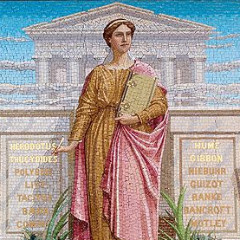
To know who you are, you have to know from where you came. As philosopher Richard Weaver put it, “there is no identity without historicity.” The bad news is that Americans—and Westerners in general—are increasingly befogged and amnesic about our past. We are losing our history, particularly touch points to our shared Christian past.
This loss is particularly noticeable in our public life. In a recent piece for the Detroit News Fr. Robert Sirico of the Acton Institute points to several unfortunate signs of this. One is the European Union’s refusal to mention God and church in its constitution, regardless of the fact that Europe would be utterly unrecognizable today without every previous generations’ belief in both.
Another is our current presidential administration’s use of “freedom of worship” rather than “freedom of religion.” Sirico admits that this last change is subtle but says the import is significant. “It is freedom of religion, not merely worship that has been venerated since the American founding,” he says. Keeping “only one dimension of religion (worship) . . . set[s] the stage to curtail its public witness.”
In both cases a denial or depreciation of the past leads to a present denigration of the faith.
So back to Richard Weaver. In his landmark book, Ideas Have Consequences, he says that because humans “are creatures of reflection, we have only the past. The present is a line, without width; the future only a screen in our minds on which we project combinations of memory.”
Realizing this, the past takes on serious substance. It is the stuff of which our present and future is composed. But as Weaver says, we want to act without the hassle of “read[ing] the minutes of the last meeting.” Rather than taking the past into account, we endeavor to “create a new world out of good will and ignorance.”
We will fail at the job. Forget shibboleths like whether America was founded as a Christian nation, which regardless of its veracity is often a source of more heat than light. Focus instead on the West’s debt to Christianity for developments in science, political liberty, literature, music, tolerance, financial institutions, our legal systems, and technology.
You can contest or protest Christianity’s role in these developments, but they are facts of our shared history. They’re in the minutes of the last meeting. Rodney Stark’s The Victory of Reason provides an easy entry to this rich past, but regardless of how we access it, if we do not then a tremendous heritage will be squandered.
Part of this loss will be institutional. Says Sirico, tying back to Weaver’s comment about identity, it “would be an inestimable loss to the sense of who we are as a people and to any real hope we might have of building a just and tolerant future.”
And it will also be personal. History is, after all, the story of people. Speaking of developments in art and economics and technology is useful if we also remember the developers. People make history. If we cut ourselves off from our past, we are cutting ourselves off from other people. A true sense of Christian community requires that we realize our debt to the believers who have gone before us. They are crucial in many ways to our salvation and growth in the faith.
To knit together a full picture of ourselves, a true identity, we have to incorporate our past. That is true for both our culture and ourselves. And that means we also must get wise about protecting and proclaiming it for our culture and ourselves.











